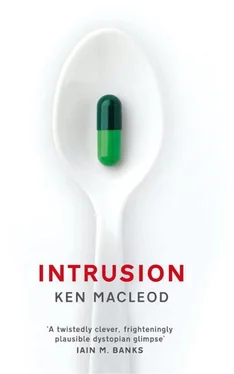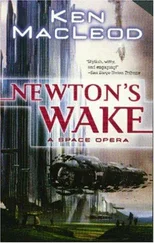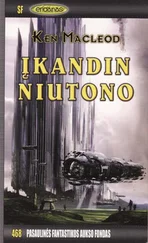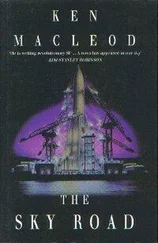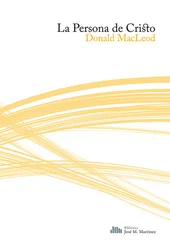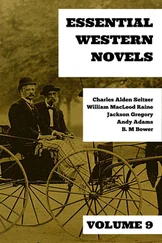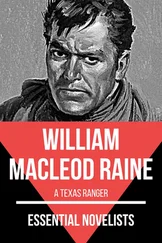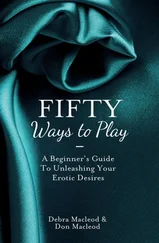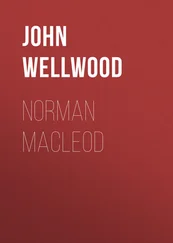‘What was all that about?’ Hope asked.
‘No idea,’ said Hugh. ‘You know how kids are. One day they’ll be scared of a colour, or a shape, because it reminds them of a bad dream or something that troubled them on television.’
‘I suppose.’
‘You know,’ Hugh confided, in a low voice, ‘I got a funny feeling there myself.’ He glanced over his shoulder, back at the site. ‘Not scared but… like there was something wrong with what I was seeing. Like… you know those puzzles in comics, “What’s Wrong With This Picture?”. Some detail out of place?’
‘Uh-huh.’
‘It was like there’s some hazard down there that everyone’s overlooked.’
‘Elf ’n’ safety?’ Hope sing-songed.
‘Something like that,’ Hugh said. ‘Oh well. Maybe I just picked up some nervousness from Nick.’
‘He’s an odd little chap!’
They both laughed, clearing the air.
Nick waited for them at the skyline.
‘What are you going to show me?’
‘Over there,’ said Hugh, a few steps below, pointing ahead, ‘there’s a big dark loch, and…’
Hope and Hugh cleared the rise and looked down. Ahead of them was a hollow between low hills, and in the bottom of that hollow, a few paces away, was a shallow loch you could throw a stone across.
‘Oh,’ said Hugh. ‘Not quite how I remember it.’
‘Has it got smaller?’
‘I think maybe I’ve got bigger,’ said Hugh.
But Nick was pleased enough to go to the water’s edge and be shown how to skip stones. Hope joined in, laughing at Hugh’s surprise as she demonstrated her own mastery of the knack.
‘Want to go down to the beach?’ Hugh asked, just before Nick got bored.
‘Yes yes yes!’
They turned and went down the hill. As they passed the site, Hope noticed, Nick kept his eyes averted. She didn’t say anything, but reached down and held his hand.
At the car, she hesitated. ‘Do you want to drive round and down, or…?’
‘Run down!’ said Nick.
They crossed the two roads, looking carefully to left and right though there was no traffic within sight or sound, and Nick scampered off ahead of them down the marram-covered dunes.
Hugh stopped for a moment, looking out towards the horizon.
‘I once wrote a poem about this place,’ he said. ‘Want to hear it?’
Hope nodded.
Hugh grinned self-consciously and declaimed:
‘The waves roll like logs into the bay
and splinter, hissing, up the beach.
Violent, even on the calmest day.
God does not know how long they took
to grind these cliffs exceeding small
to a thousand million tons of sand.
‘The new cemetery on the headland fills
with headstones like hilts in a stabbed back.
The minister stands on slowly shifting hills
and does it by the book: “Their souls are immortal,
their bodies
rest till the resurrection.”
‘Their souls are electrochemical
tracks in others’ brains. Their bodies
under the sharp, salt-water grass
are earthed.
The Atlantic ignores the land.’
Hope mimed a startled recoil of the head. ‘You wrote that?’
‘When I was in school, like. I mean, I was fifteen.’
He sounded defensive.
‘No, no, it’s not bad, I just never thought…’
‘I had any poetry in me? Not now I don’t. But we had to do it for English.’
‘No, I meant… it’s kind of harsh. What brought that on?’
‘Ach,’ said Hugh. ‘I had not long discovered materialism, and my father had just discovered Presbyterianism.’
Hope considered him gravely. ‘I think that excuses it,’ she said.
‘Race you to the beach,’ he said.
‘Not in my condition.’
‘Oh. I forgot.’
She clouted his shoulder.
They raced each other down to the sand.
That Sunday morning, Hugh retrieved an old suit, shirt and tie of his from a wardrobe. They fitted well enough, though he kept running his finger under his collar. He borrowed a Bible, left his phone on the bedside table, and after breakfast walked with his father to the church. Hope and Mairi had plans to take Nick for a drive to the nearest beach – in the last couple of days he’d taken in a big way to playing in breaking waves, and Mairi had bought him a drysuit at one of the village shops. Mairi’s own shop was closed for the day, in her only deference (other than not doing any housework) to Nigel’s Sabbath-keeping. The previous evening, Nigel had pitched in with Mairi and Hope in preparing as much as possible of today’s meals in advance: peeling the potatoes and carrots, boiling a chicken in the pressure cooker, even setting the table for breakfast. The irony that all this work was being done on the actual, original, Biblical Sabbath didn’t seem to bother him at all, and Hugh had long since given up baiting him on the subject.
The rest of the village had long since given up on keeping the Sabbath. Most of the shops were open. The tide was out and the seaweed smelled like bad breath. Tourists and visitors strolled about in the sunshine, buying tat and hiring cars, bikes and boats. Among them, carefully ignoring them, little trickles and rivulets of more soberly clad people – men in dark suits and Homburgs, women in skirts below the knee and wearing often elaborate hats, children in smaller versions of the same outmoded outfits – walked from a few houses and from the car park to the church down by the shore, and, as if to their own surprise, converged as a congregation of three score or more.
After they’d gone to bed on the Saturday night, happily tired after a day walking in the hills and running on a beach, Hope had suggested to Hugh that she accompany Nigel to the church.
‘No,’ Hugh had said, without hesitation.
‘Why not?’
‘You’d find it strange.’
‘That’s the point.
I’m curious.’
‘Maybe another time. When you know Nigel better. Trust me, you’d find it boring and alienating.’
‘You mean you’d find it embarrassing.’
‘Yes,’ he’d conceded.
He didn’t find it embarrassing himself. In his teens he’d gone along a few times, he knew what to expect. Other than the fine woodwork of pew and pulpit, the church was harsh in its simplicity: whitewashed walls, windows of frosted rather than stained glass, no choir or musical instruments to accompany the singing. So too was the service. Psalms dolefully sung sitting down, prayers nasally intoned standing up, a sermon expounding an Old Testament verse and offering the gospel in a take-it-or-leave-it manner, with a heavy hint that most of those present, despite hearing such sermons at least twice a week all their lives, would leave it, and be left themselves to the outer darkness, where there would be wailing and gnashing of teeth. The burden of the sermon was an explication of the imprecations against Babylon in one of the psalms, the Authorised Version of which the minister had read as his text and the Scottish metrical version of which the congregation had sung. The sermon seemed to be making some contemporary reference, but it was so coded in metaphor and allusion that Hugh wasn’t sure whether Babylon represented Moscow, Beijing, Washington, London, Brussels, the Vatican, or some hydra-headed multi-tentacled hallucinatory manipulatory illuminati behind all of them. His voice joined those of the congregation in the psalm’s uplifting cadence:
O daughter thou of Babylon,
near to destruction!
Blest shall he be who thee rewards
as thou to us hast done!
Yea, happy surely shall he be
thy tender little ones
who shall lay hold upon, and them
shall dash against the stones.
Читать дальше
